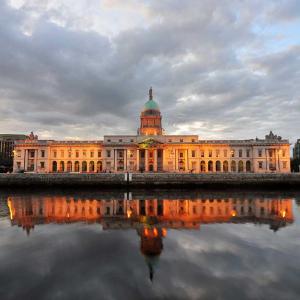By Nick Mann | 17 May 2012
An ‘unplanned’ breakup of the eurozone could cost the members of the single currency $1 trillion, the Centre for Economics and Business Research said today.
According to the think-tank, the end of the euro in its current form is a ‘certainty’ due to unsustainable levels of public spending and debt and the lack of competiveness of weaker eurozone economies such as Greece and Italy.
Even if a currency called the euro does survive, it will be ‘radically transformed’, the CEBR said, with the only question being the timing and way in which the current single currency bloc splits.
A ‘planned’ breakup could cost the eurozone around $300bn, but in the ‘rather more likely’ event of an unplanned breakup, this could be as much as $1trn.
‘There is no doubt that when the euro breaks up it will be costly. Some countries will lose around 10% of annual gross domestic product,’ said the CEBR’s chief executive, Douglas McWilliams. ‘But this will happen anyway – the choice is between a period of austerity followed by the impact of the end of the euro and then some eventual recovery or facing the trauma of the end of the euro early and then starting to get the recovery under way.’
‘By, say, 2025, it is about as certain as anything can be in economics that the European economy will be in better shape if it faces up to the trauma of breaking up the euro now rather than in a few years time,’ he added.
The CEBR’s forecast came as UK Prime Minister David Cameron this morning warned that unless stability was restored in the eurozone it was at risk of falling apart.
‘The eurozone is at a crossroads,’ he said. ‘It either has to make up or it is looking at a potential break-up. Either Europe has a committed, stable, successful eurozone with an effective firewall, well capitalised and regulated banks, a system of fiscal burden sharing, and supportive monetary policy across the eurozone – or we are in uncharted territory which carries huge risks for everybody.’
In particular, Cameron said less competitive eurozone countries with high deficits had to tackle their problems ‘head on’ by reducing spending, increasing revenues and undertaking structural reform to become more competitive.
‘The idea that high deficit countries can borrow and spend their way to recovery is a dangerous delusion,’ he said.
At the same time the ‘core’ of the eurozone, including the European Central Bank, should do more to support demand and share the burden of adjustment through monetary policy. Cameron welcomed new French president François Hollande’s proposals for project bonds, where public funds are invested in infrastructure projects to encourage private investment. He also backed moves to explore the potential for eurobonds – a bond jointly issued by the 17 eurozone members to raise funds.
‘Steps such as these are needed to put an end to speculation about the future of the euro,’ he said. Moves should also be made to address Europe’s low productivity and lack of economic competiveness with a ‘pro-business, pro-growth’ agenda, he added.












